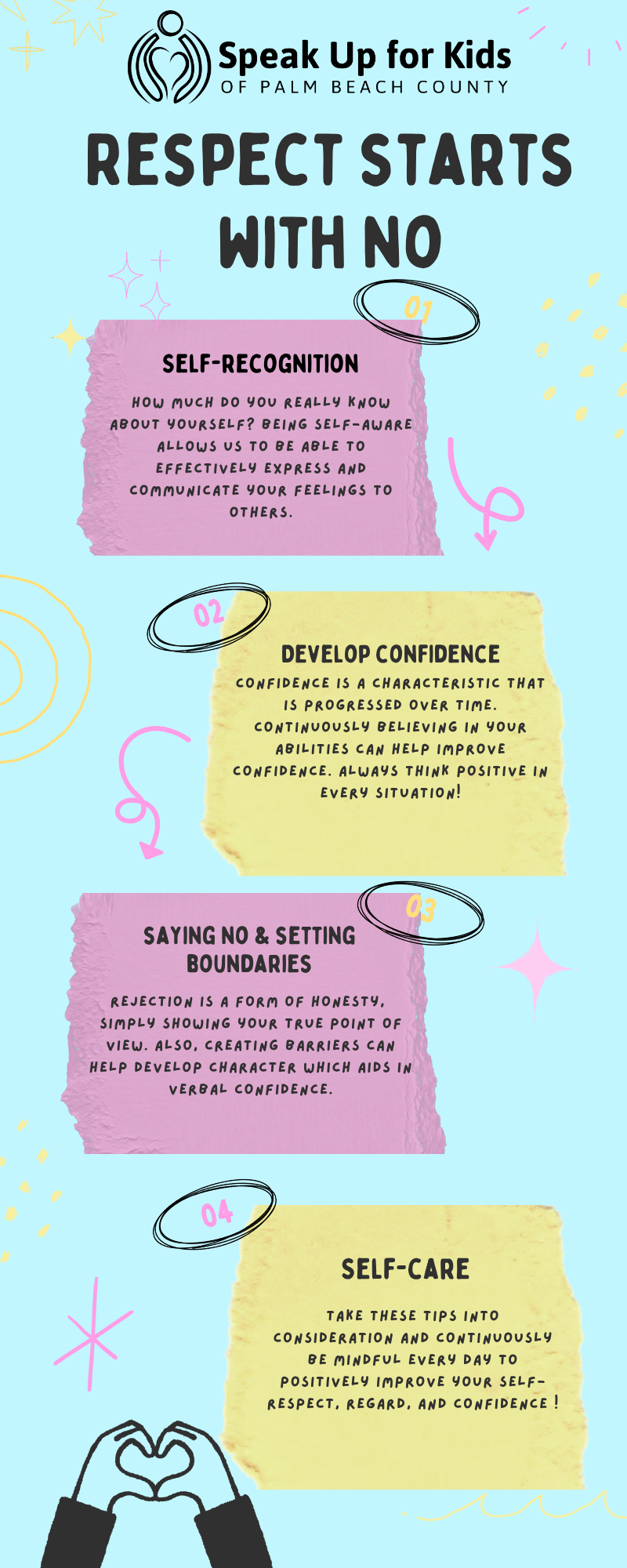Respect Starts With No
Contributed by Lavia Phan—A Students Speak Up for Kids Volunteer.
Overview
As you are making your way out of the foster care system, self-respect is critical to the journey of personal growth. Understanding the power of your words and how to be wise with your choices is a simple concept. Did you know that a common word many young adults struggle to use is simply “no?” Let’s dive into the importance of having strong self morals and how saying “no” enhances self-integrity.
What is Self-Respect?
Self-respect is an appreciation of your identity as an individual, which in turn impacts your thoughts, values, emotions, commitments, and behaviors throughout life and its experiences. Through the life of an individual, their separate experiences are what build each person’s personality and character. Moreover, self-respect is a vital part of life that significantly impacts every human being.
Self-Respect - Confidence in yourself and your behavior.
Understanding Oneself:
The first step in building the confidence to say “no”, is ensuring that you understand yourself before you go out into the world trying to please the lives of others.
Mentality is a person’s way of thinking and processing information that impacts their attitude or way of approaching a situation. Your mentality is the bridge between personal dignity and the demands of the outside world. Having self-respect means having a healthy regard for your character, beliefs, and dignity.
By an individual being their most authentic self, they are honoring themselves and their unique characteristics that differentiates them from others.
The Link Between Boundaries and Respect
Rejection is a crucial aspect of effective communication, which is the reason why word usage in a conversation is important to reliably communicate with others. With rejection comes the acknowledgement of independence and can be a step towards confidence growth.
Benefits: By saying no, you are protecting your energy, time, and self value. When we communicate these boundaries to others, we are verbally expressing what is acceptable and what is not between the relationship. With boundaries in place, you are saying to yourself that your needs matter and that you care for yourself.
These are the vital steps to build a more positive environment with people that care for you, your opinions, and most importantly the boundaries that you have set.
Being Real Over Being Nice
Truth holds power and by being honest with other people, it may bridge a connection to a strong, positive, open and honest relationship.
Being real doesn’t mean being rude, it means being authentic. It means having the courage to speak up when necessary, and to express your truth KINDLY and clearly.
Relationships with other people, whether it is romantic or friendly, will always be held by strong pillars of honesty–which is what keeps the strongest of friendships stable.
Saying “No” May Be Difficult
At first, it may seem harsh or even rude to not constantly be accepting of other people's opinions, but you’ll soon learn that not every aspect must constantly be agreed upon to make you a “better person.”
A genuinely good person with good intentions is sincere with their words and doesn't constantly lie in order to be deemed “kind.” Even if it takes telling people “no”, you are doing them an undeniable favor at the end of the day. And remember that this is extremely ordinary to be a tad bit intimidated by the word “no!”
Honoring the Word “No” is Honoring the Person
Also, remember that you are never obligated to do anything, even if you're being pressured by a peer. NO means NO and if another individual is not respecting that, while continuing to convince you to do something, potentially reconsider the relationship between you and the other person.
This also goes for the way that you respond to another person and their choices, if they choose to reject your ideas, respect it. Additionally, you are saving yourself the possibility of unwanted conflict. By recognizing another individual's perspective and respecting their ideas, you are wisely handling a situation.
Final Thoughts
Respect isn’t just about how we treat others, it’s also about how we allow ourselves to be treated. Saying “no” isn’t rude, selfish or unkind; it’s a strong act of self-regard. When we set boundaries, we teach others how to value us, and create a space for a healthier, more honest connection that will slowly help us grow in a positive way. It is essential that respect begins with the courage to say “no” when we need to, and the grace to accept it when we hear it from someone else.


